How to Know the Difference Between Lie and Lay
Jump to navigation
Jump to search

It is not that these two words are from very different roots. In contrast to many English words, which are from Latin/French origin, both words are from the Old English (Germanic) root licgan, which means a sleeping place. The word lair is also from the same root. Differentiating usage of lie and lay sometimes becomes difficult. Another word lie meaning false claim which is completely from a different root, adds to the difficulty.
Steps
- Know that lay is a regular verb; that is, it is easy to remember its past and perfect participle.
- Past participle : Laid.
- Perfect participle : Laid.
- Gerund : Laying.
- Subjective Noun : Layer (as in brick-layer).
- Past participle : Laid.
- Contrast lie as an irregular verb; that is, one should memorise its past and perfect participle.
- Past participle : Lay.
- Perfect participle : Lain.
- Gerund : Lying.
- Subjective Noun : Not possible.
- Past participle : Lay.
- Keep in mind that Lay is a transitive verb; that is, it needs an object to act on.
- I laid my head on the desk for a minute. (lay, laid, laid, laying)
- I laid the book on the floor. (lay, laid, laid, laying)
- I laid my head on the desk for a minute. (lay, laid, laid, laying)
- Remember, though, that lie is intransitive; that is, it does not need an object. Not only it does not need an object but that it does not accept an object to act on.
- His noble head had lain on the pillow, talking calmly. (lie, lay, lain, lying)
- I lay on the sandy ground and gazed at stars. (lie, lay, lain, lying)
- His noble head had lain on the pillow, talking calmly. (lie, lay, lain, lying)
- Contrast lie meaning to say something false. It is a regular verb; that is, it is easy to remember its past and perfect participle.
- Past participle : Lied.
- Perfect participle : Lied.
- Gerund : Lying
- Subjective noun : Liar
- Past participle : Lied.